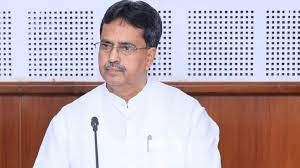Tripura CM Manik Saha expresses concern over low pass rate in Teacher Eligibility Test results, says no irregularities in question papers

Tripura Chief Minister Manik Saha has raised concern over the poor results in the state’s recent Teacher Eligibility Tests (TET). While candidates reported issues, the Chief Minister confirmed that experts followed all guidelines while setting the papers. No irregularities were found, and he reassured the public that the exams were conducted fairly.
In TET-I, only 458 candidates cleared the test out of 8,240. That’s just 5.56%. For TET-II, only 1,589 out of 32,286 passed, which is a 4.92% success rate. These numbers have sparked worry about the readiness of future teachers in Tripura.
CM Saha: “Worrisome for the Education System”
CM Manik Saha openly admitted the results are troubling. “This is a serious concern. Government schools rely on qualified teachers. If such a small number qualify, the learning environment suffers,” he said.
Despite the results, he clarified that the Teachers’ Recruitment Board (TRBT) did not find any mistakes in the papers. “Experts designed the exam papers carefully. The board followed the syllabus and testing standards,” he added.
No Irregularities, Legal Option Open for Aspirants
Several candidates claimed that some questions were outside the syllabus or unclear. But Saha firmly stated there were no flaws in the question papers. He encouraged those who feel wronged to take their concerns to court. “Everyone has the right to challenge the results through legal channels,” he said.
The Chief Minister emphasized that the system allows for transparency. He said the TRBT remains open to scrutiny and welcomes fair reviews if someone raises a genuine issue.
Protests Emerge: Aspirants Demand Re-evaluation
Frustration among aspirants grew after the results. Groups of students protested in front of the TRBT office in Agartala. They questioned the fairness of the exams and demanded a review of the answer keys.
Some candidates said the questions didn’t match their study material. “We studied based on the official syllabus. But some questions looked unfamiliar or seemed incorrect,” said one protester.
The protests reflect growing anxiety among those preparing to become teachers. Many believe the system may be failing them.
Experts Warn About the Impact on Education
Education experts have also expressed concern. They warn that a continued shortage of qualified teachers could hurt student performance in public schools.
“This result is not just a number. It reflects serious issues in either teacher training or exam preparation,” said an Agartala-based academic.
Experts suggest a deeper look into the TET ecosystem. This includes reviewing training institutes, coaching classes, study material, and the difficulty level of exams. They also recommend reviewing how the papers are marked.
CM Orders Probe into Root Causes
Following the backlash, CM Saha asked the Education Department to examine the low success rate. He insisted that the papers were set by experienced professionals. Still, he believes it’s important to understand why the results were so poor.
The review will focus on:
- The quality of training aspirants receive
- Alignment of questions with the official syllabus
- The evaluation process
- How the exam format might affect candidate performance
“We should not simply blame candidates. We must understand where the system may be falling short,” Saha said.
Will the TET System See Reforms?
Though no formal changes have been announced, signs point toward possible reforms. Officials may consider adjusting the exam pattern or offering more training resources. Some suggest offering mock tests, guidelines, or syllabus alignment workshops to better prepare candidates.
Tripura’s education system cannot afford to continue with such low teacher qualification rates. As more government schools face staff shortages, the government will likely face increasing pressure to act fast.
Conclusion
Tripura’s recent TET results have stirred concern among students, educators, and government officials. The low pass rates raise critical questions about the quality of exam preparation and teaching standards in the state.
CM Saha has made it clear that the exams were fair. However, he also recognizes the need to review the situation thoroughly. The coming months will reveal whether the state introduces structural changes or maintains the status quo.
With thousands of aspiring teachers affected, the government must find a balance between upholding high standards and supporting candidates who genuinely want to teach. For Tripura’s future educators—and students—this is a moment of reckoning.






